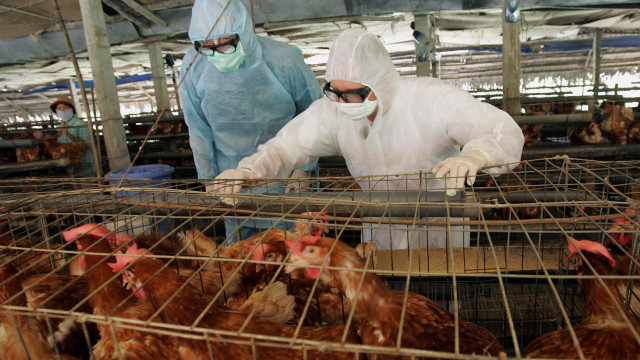






























See Also
See Again
Pregnancy denial: all about this psychological condition
- The term 'pregnancy denial' is quite self-explanatory - it is when a pregnant woman denies that she is pregnant, sometimes right up until the baby is born. If you have never experienced pregnancy denial first-hand, the concept can be a little difficult to grasp. However, pregnancy denial is a very real condition and it is more common than you might think. For a long time, pregnancy denial was understudied, but that is slowly starting to change and there is a growing body of research that looks at why it happens and whether certain groups of women are at higher risk. Curious? Check out this gallery to find out more.
© Shutterstock
0 / 31 Fotos
What is pregnancy denial?
- Pregnancy denial is a psychological condition in which a pregnant woman denies that she is pregnant.
© Shutterstock
1 / 31 Fotos
Number of cases
- The incidence of pregnancy denial is higher in early-stage pregnancies. Indeed, it is estimated that at 20 weeks, pregnancy denial is found in one in every 475 women.
© Shutterstock
2 / 31 Fotos
Number of cases
- By the time pregnancy reaches the delivery stage, however, the incidence of denial drops to one in every 2,500 women.
© Shutterstock
3 / 31 Fotos
Two categories
- Pregnancy denial can be either psychotic or non-psychotic, and there are various forms of the condition that fall into the second category.
© Shutterstock
4 / 31 Fotos
Growing body of research
- For a long time, scientists did not know much about pregnancy denial or why it happens, but slowly that is starting to change.
© Shutterstock
5 / 31 Fotos
Psychotic denial
- Cases of psychotic denial occur in women who have long-term mental disorders, such as schizophrenia, that continue through their pregnancies.
© Shutterstock
6 / 31 Fotos
Swinging from extremes
- In cases of psychotic denial, the woman may fluctuate between openly accepting her pregnancy and denying it outright.
© Shutterstock
7 / 31 Fotos
Denying symptoms
- When she is in the denial stage, she may refuse to accept that the symptoms she is experiencing have anything to do with being pregnant.
© Shutterstock
8 / 31 Fotos
Non-psychotic denial
- When it comes to non-psychotic pregnancy denial, there are three main forms. The first is pervasive denial. This is what happens when a woman refuses to let the fact that she is pregnant enter her consciousness.
© Shutterstock
9 / 31 Fotos
Affective denial
- Then there is affective denial, which is where the woman knows that she is pregnant, but refuses to react to the fact.
© Shutterstock
10 / 31 Fotos
Affective denial
- In cases of affective pregnancy denial, the woman may refuse to take care of herself and/or the fetus.
© Shutterstock
11 / 31 Fotos
Persistent denial
- And finally, there is persistent denial. This describes cases in which a woman denies that she is pregnant right up until the third trimester.
© Shutterstock
12 / 31 Fotos
Cause
- Scientists are not sure about what causes pregnancy denial, but it is believed to result from a failure to adjust to the conditions and requirements of pregnancy.
© Shutterstock
13 / 31 Fotos
Overwhelming fear
- Pregnancy comes with changing physical needs and demands, and being unable to adapt to that can cause an overwhelming sense of fear about one’s capacity to care for a baby.
© Shutterstock
14 / 31 Fotos
Overwhelming fear
- In extreme cases, it is believed that these doubts and fears can cause a woman to deny her pregnancy.
© Shutterstock
15 / 31 Fotos
Risk factors
- According to the research, there are certain factors that can increase a woman’s chance of going into pregnancy denial.
© Shutterstock
16 / 31 Fotos
Risk factors
- Studies show, for example, that young and first-time mothers may be at higher risk.
© Shutterstock
17 / 31 Fotos
Risk factors
- There are also studies that show a higher incidence of pregnancy denial in women who have a low degree of social support, a history of substance abuse, or a history of psychiatric disorder.
© Shutterstock
18 / 31 Fotos
Not a prerequisite
- However, the presence of these factors is by no means a prerequisite. Indeed, a woman may experience pregnancy denial without any of these factors.
© Shutterstock
19 / 31 Fotos
Other factors
- In certain cases, other factors such as not wanting the pregnancy, or having a desirable job that is not compatible with pregnancy, may play a role.
© Shutterstock
20 / 31 Fotos
Complications
- Pregnancy denial can cause various complications for both the baby and the mother, including a lack of antenatal care and neglect of the newborn.
© Shutterstock
21 / 31 Fotos
Diagnosis
- However, pregnancy denial can be very difficult to detect, precisely because the woman does not want her pregnancy to be detected.
© Shutterstock
22 / 31 Fotos
Diagnosis
- According to one study, almost four in every 10 women with pregnancy denial had seen a doctor with symptoms such as nausea or tummy pain, but without being diagnosed as pregnant.
© Shutterstock
23 / 31 Fotos
Covering all bases
- Increasingly, therefore, doctors are being encouraged to entertain the possibility of pregnancy in all women of reproductive age who have symptoms of pregnancy.
© Shutterstock
24 / 31 Fotos
Covering all bases
- This should be the case, irrespective of how much they protest that they simply cannot be pregnant.
© Shutterstock
25 / 31 Fotos
Ultimate risk
- In cases of persistent denial, emergency psychiatric care is needed to eliminate the risk of neonatal killing. In cases of psychotic denial, a mother may even take her baby’s life on purpose.
© Shutterstock
26 / 31 Fotos
Ultimate risk
- Even in cases of non-psychotic denial, it is possible that a mother passively brings about the death of her child by neglect and exposure.
© Shutterstock
27 / 31 Fotos
Treatment
- In all cases of pregnancy denial, treatment is required to bring the expectant mother’s struggles out into the open.
© Shutterstock
28 / 31 Fotos
Support and training
- Social and family support is paramount, and training in parenting skills is advised. Any underlying psychiatric illnesses should, of course, be treated.
© Shutterstock
29 / 31 Fotos
Follow-up
- Once the baby is born, follow-up is crucial so that doctors can monitor the health and development of both the mother and the child. Sources: (News Medical)
© Shutterstock
30 / 31 Fotos
Pregnancy denial: all about this psychological condition
- The term 'pregnancy denial' is quite self-explanatory - it is when a pregnant woman denies that she is pregnant, sometimes right up until the baby is born. If you have never experienced pregnancy denial first-hand, the concept can be a little difficult to grasp. However, pregnancy denial is a very real condition and it is more common than you might think. For a long time, pregnancy denial was understudied, but that is slowly starting to change and there is a growing body of research that looks at why it happens and whether certain groups of women are at higher risk. Curious? Check out this gallery to find out more.
© Shutterstock
0 / 31 Fotos
What is pregnancy denial?
- Pregnancy denial is a psychological condition in which a pregnant woman denies that she is pregnant.
© Shutterstock
1 / 31 Fotos
Number of cases
- The incidence of pregnancy denial is higher in early-stage pregnancies. Indeed, it is estimated that at 20 weeks, pregnancy denial is found in one in every 475 women.
© Shutterstock
2 / 31 Fotos
Number of cases
- By the time pregnancy reaches the delivery stage, however, the incidence of denial drops to one in every 2,500 women.
© Shutterstock
3 / 31 Fotos
Two categories
- Pregnancy denial can be either psychotic or non-psychotic, and there are various forms of the condition that fall into the second category.
© Shutterstock
4 / 31 Fotos
Growing body of research
- For a long time, scientists did not know much about pregnancy denial or why it happens, but slowly that is starting to change.
© Shutterstock
5 / 31 Fotos
Psychotic denial
- Cases of psychotic denial occur in women who have long-term mental disorders, such as schizophrenia, that continue through their pregnancies.
© Shutterstock
6 / 31 Fotos
Swinging from extremes
- In cases of psychotic denial, the woman may fluctuate between openly accepting her pregnancy and denying it outright.
© Shutterstock
7 / 31 Fotos
Denying symptoms
- When she is in the denial stage, she may refuse to accept that the symptoms she is experiencing have anything to do with being pregnant.
© Shutterstock
8 / 31 Fotos
Non-psychotic denial
- When it comes to non-psychotic pregnancy denial, there are three main forms. The first is pervasive denial. This is what happens when a woman refuses to let the fact that she is pregnant enter her consciousness.
© Shutterstock
9 / 31 Fotos
Affective denial
- Then there is affective denial, which is where the woman knows that she is pregnant, but refuses to react to the fact.
© Shutterstock
10 / 31 Fotos
Affective denial
- In cases of affective pregnancy denial, the woman may refuse to take care of herself and/or the fetus.
© Shutterstock
11 / 31 Fotos
Persistent denial
- And finally, there is persistent denial. This describes cases in which a woman denies that she is pregnant right up until the third trimester.
© Shutterstock
12 / 31 Fotos
Cause
- Scientists are not sure about what causes pregnancy denial, but it is believed to result from a failure to adjust to the conditions and requirements of pregnancy.
© Shutterstock
13 / 31 Fotos
Overwhelming fear
- Pregnancy comes with changing physical needs and demands, and being unable to adapt to that can cause an overwhelming sense of fear about one’s capacity to care for a baby.
© Shutterstock
14 / 31 Fotos
Overwhelming fear
- In extreme cases, it is believed that these doubts and fears can cause a woman to deny her pregnancy.
© Shutterstock
15 / 31 Fotos
Risk factors
- According to the research, there are certain factors that can increase a woman’s chance of going into pregnancy denial.
© Shutterstock
16 / 31 Fotos
Risk factors
- Studies show, for example, that young and first-time mothers may be at higher risk.
© Shutterstock
17 / 31 Fotos
Risk factors
- There are also studies that show a higher incidence of pregnancy denial in women who have a low degree of social support, a history of substance abuse, or a history of psychiatric disorder.
© Shutterstock
18 / 31 Fotos
Not a prerequisite
- However, the presence of these factors is by no means a prerequisite. Indeed, a woman may experience pregnancy denial without any of these factors.
© Shutterstock
19 / 31 Fotos
Other factors
- In certain cases, other factors such as not wanting the pregnancy, or having a desirable job that is not compatible with pregnancy, may play a role.
© Shutterstock
20 / 31 Fotos
Complications
- Pregnancy denial can cause various complications for both the baby and the mother, including a lack of antenatal care and neglect of the newborn.
© Shutterstock
21 / 31 Fotos
Diagnosis
- However, pregnancy denial can be very difficult to detect, precisely because the woman does not want her pregnancy to be detected.
© Shutterstock
22 / 31 Fotos
Diagnosis
- According to one study, almost four in every 10 women with pregnancy denial had seen a doctor with symptoms such as nausea or tummy pain, but without being diagnosed as pregnant.
© Shutterstock
23 / 31 Fotos
Covering all bases
- Increasingly, therefore, doctors are being encouraged to entertain the possibility of pregnancy in all women of reproductive age who have symptoms of pregnancy.
© Shutterstock
24 / 31 Fotos
Covering all bases
- This should be the case, irrespective of how much they protest that they simply cannot be pregnant.
© Shutterstock
25 / 31 Fotos
Ultimate risk
- In cases of persistent denial, emergency psychiatric care is needed to eliminate the risk of neonatal killing. In cases of psychotic denial, a mother may even take her baby’s life on purpose.
© Shutterstock
26 / 31 Fotos
Ultimate risk
- Even in cases of non-psychotic denial, it is possible that a mother passively brings about the death of her child by neglect and exposure.
© Shutterstock
27 / 31 Fotos
Treatment
- In all cases of pregnancy denial, treatment is required to bring the expectant mother’s struggles out into the open.
© Shutterstock
28 / 31 Fotos
Support and training
- Social and family support is paramount, and training in parenting skills is advised. Any underlying psychiatric illnesses should, of course, be treated.
© Shutterstock
29 / 31 Fotos
Follow-up
- Once the baby is born, follow-up is crucial so that doctors can monitor the health and development of both the mother and the child. Sources: (News Medical)
© Shutterstock
30 / 31 Fotos
Pregnancy denial: all about this psychological condition
Causes, symptoms, and treatment
© Shutterstock
The term 'pregnancy denial' is quite self-explanatory—it is when a pregnant woman denies that she is pregnant, sometimes right up until the baby is born. If you have never experienced pregnancy denial first-hand, the concept can be a little difficult to grasp. However, pregnancy denial is a very real condition and it is more common than you might think.
For a long time, pregnancy denial was understudied, but that is slowly starting to change and there is a growing body of research that looks at why it happens and whether certain groups of women are at higher risk.
Curious? Check out this gallery to find out more.
RECOMMENDED FOR YOU






























MOST READ
- Last Hour
- Last Day
- Last Week








